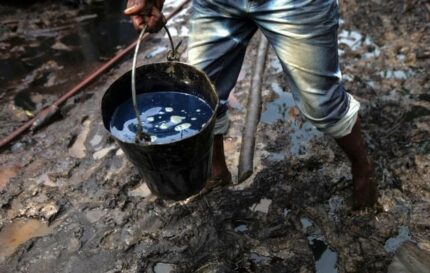The Nigerian National Petroleum Corporation (NNPC) has announced 400 cases of oil theft in a single week, highlighting the increasing problem of illicit oil actions that persist in the country’s oil sector.
The NNPC announced that incidents took place in different oil-producing areas, causing a notable impact on Nigeria’s oil production and revenue. The increase in oil theft activities presents a significant risk to the nation’s economy and energy stability.
“This alarming rise in oil theft is a major concern for the NNPC and the nation as a whole,” stated NNPC Group Managing Director, Mele Kyari. “These illegal activities not only cause substantial financial losses but also endanger the environment and local communities.”
The NNPC highlighted that the theft incidents have been recorded in the Niger Delta region, where oil pipelines and infrastructure are frequently targeted by criminal syndicates. The stolen oil is often sold on the black market, depriving the Nigerian government of much-needed revenue.
“Oil theft is a sophisticated operation involving well-organized networks,” Kyari added. “We are working closely with security agencies and local communities to address this menace. Enhanced surveillance and rapid response teams have been deployed to critical areas to mitigate these activities.”
The financial impact of oil theft is profound, with estimates suggesting that Nigeria loses billions of dollars annually due to this illegal practice. The NNPC’s recent figures indicate that the losses in the past week alone could amount to hundreds of millions of dollars, further straining the nation’s fiscal position.
“Combating oil theft requires a multi-faceted approach,” said Minister of Petroleum Resources, Timipre Sylva. “We are intensifying efforts to strengthen our security measures, improve community engagement, and implement advanced technologies for pipeline monitoring and protection.”
The Nigerian government has also called on international partners to assist in tackling the issue, recognizing that the illicit trade of stolen oil often extends beyond national borders. Collaborative efforts are being made to track and intercept stolen oil shipments in global markets.
Environmentalists have raised concerns about the ecological damage caused by oil theft. The illegal tapping of pipelines often leads to spills and leaks, contaminating water sources and farmland, and causing long-term harm to local ecosystems and public health.
“Oil spills resulting from theft are devastating to the environment,” noted environmental activist, Nnimmo Bassey. “The pollution impacts not just the immediate area but has far-reaching effects on biodiversity and the livelihoods of communities dependent on clean land and water.”
In response to the crisis, the NNPC has also announced plans to invest in pipeline modernization and secure infrastructure. The corporation is exploring the use of drones, satellite imagery, and other advanced technologies to monitor pipeline networks and detect breaches in real-time.
As the government and NNPC ramp up efforts to combat oil theft, there is a pressing need for comprehensive strategies that address both the symptoms and root causes of the problem. Ensuring economic stability and environmental protection hinges on the success of these initiatives.
The NNPC’s report of 400 incidents of oil theft in a single week highlights the urgency of addressing this critical issue. With coordinated action and sustained commitment, Nigeria aims to safeguard its oil industry and secure a more prosperous and stable future.
